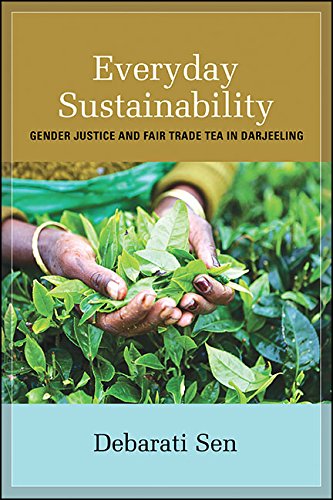
The global discourse on sustainability and justice often falls short in its engagement with issues of social and cultural justice. This includes engagement with alternative movements such as Fair Trade. In Everyday Sustainability, Debarati Sen begins by recognising the deficits in Fair Trade, critically analysing the movement’s aims to protect the interests of the structurally vulnerable in postcolonial economies. Through a feminist ethnography of Fair-Trade Tea production in Darjeeling, India, Sen argues that the institutional practices of Fair Trade are removed from complex local realities and this leads to inadvertent support of oppressive systems of patriarchy and capitalism that devalue women’s labour.
Everyday Sustainability: Gender Justice and Fair-Trade Tea in Darjeeling by Debarati Sen (published by SUNY Press in 2017) focuses on the gendered social structures of Nepali women across two sites of tea production: women working on tea plantations and smallholder women tea farmers of a local cooperative. It is the practices and processes through which women in these two sites learn about Fair Trade and “evaluate its effectiveness in addressing their everyday struggles over resources, representation and entrepreneurship” (pp 11-12) that Sen refers to as “Everyday Sustainability”.
The book describes the social, cultural, and political milieu shaped by a place-based history of Darjeeling that has a significant bearing on the capacities of women to engage with transnational justice regimes such as Fair Trade. Sen makes a case for expanding the theoretical framework for social reproduction from focusing solely on economic needs (See: Sanyal, 2007) to include cultural, economic, political, and affective work. The key focus in the book is “gendered projects of value”, symbolised by women navigating the local cultural terrains while working towards Fair Trade tea production. These projects include the women’s everyday cultural and economic entrepreneurial activities to support their families and individual aspirations.
The thick ethnography detail the micro-translations of Fair Trade by women plantation workers and smallholder tea farmers, where the women accept, rebuke and resist Fair Trade’s institutional practices. The complex micro-translations Sen states help in questioning the widespread valorisation by Fair Trade of women farmers as skilled, powerful, and happy. Such valorisation supports Fair Trade’s expansion despite the continuing struggles of women navigating a challenging cultural terrain typified by high levels of male unemployment and deep patriarchal norms.
To demonstrate the distance between Fair Trade’s valorisation of women and complex local realities, Sen extends considerable effort in explaining the contrast between the micro translations of women plantation workers and that of smallholder farmers. The social and cultural practices in these two sites influenced the bargaining and decision-making powers of the women, where despite similar economic conditions, smallholder women farmers fared better. Access to resources such as land, autonomy over their time and involvement in a cooperative meant smallholder women tea farmers could voice their demands for economic justice, for instance, by demanding equitable payments of Fair-Trade Premium. More importantly, the women tea farmers could repoliticise Fair Trade as swachcha vyapar or clean trade through training and workshops on Fair Trade.
In contrast, the book shows how women on plantations have a lower social status than tea farmers. They are caught between the oppressive disciplining of daily wage and a gross lack of access to resources such as land, training, and time. Further, the hierarchical and non-democratic institutional structures on Fair Trade plantations within a patriarchal culture severely constrained the women’s negotiating and bargaining power. Histories of disciplining based on shaming and coercion on plantations meant women relied on hidden groups such as ghumauri for savings, mentoring and support. Analysis of ethnographic vignettes explains that women’s informal organising, while predominantly a protective and therapeutic measure, does, however, bring to the fore the hidden and subversive dimensions of Fair Trade. In particular, it brings to the fore the paradox of Fair Trade, where its lack of understanding of complex intersectional histories undermines the movement’s desire to protect the structurally vulnerable and unleash women’s entrepreneurial potential.
Everyday Sustainability alerts us to instances of the justice imaginaries of women, which can be counter-hegemonic to neoliberal governmentalities. It makes a critical input in challenging the “soft biopolitics” of Fair Trade in measuring its success by superficially valorising women’s labour. The book throws light on the complexity of Fair-Trade Tea Production in Darjeeling. Readers would have welcomed a deeper reflection on the mediating role played by the author between the two sites. It may have shed further light on the influence of the movement on the two sites as “gendered projects of value”. One makes this observation since the author does mention the curiosity that women have about power and agency. In sum, “Everyday Sustainability” helps articulate “Epistemologies of the South” and advances projects on generative interactions between theory and practice, local and global, and formal and informal spaces.
***
Dr Vrinda Chopra is a senior writing tutor at the Centre for Writing and Communication, Ashoka University. She is a Human Geographer with research interests focussing on postcolonial development, social economy, and marginalisation.